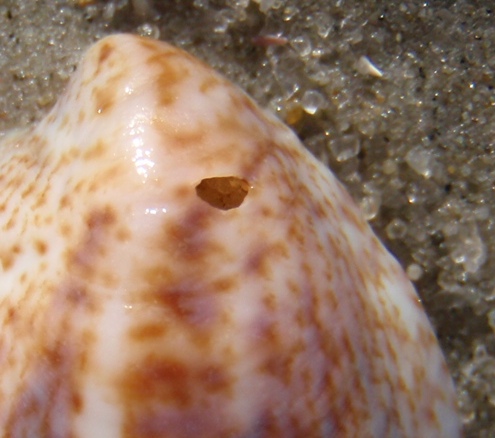Low tide came early today. The water temperature is
down to 40 degrees--the clams are, well, clammed up now, waiting like the rest of us for this winter nonsense to pass.
Clams eat, they grow. I like to eat them, but I also like the idea of them. I like the way they fit in my palm, I like being on the flats where they live. I like the way my rake resonates against one. I reach into the chill and scoop it up.
Never heard one say "Drat!"
***
Clamming by hand has a cost. I stir up the bottom with my rake, enough that fish will snoop in the area I just disturbed.
I occasionally impale critters not meant for the dinner table--I managed to spear two young horseshoe crabs on a bad afternoon clamming (though a worse day for them).
But I at least knew for a moment the creatures I wounded. Knowing didn't make the agony of the broken horseshoe crabs any less painful, though they at least got a prayer as they sank to their deaths.
We got ourselves tossed out of the Garden a few thousand years ago--clamming is about as close to the Garden as I'm going to get.
I do nothing to deserve the clams, they just are.
I barely need to work to get them, they're abundant at my feet.
I'm just close enough to wilderness to wonder what we lost when we decided to stay home and plant wheat 10,000 years ago.
I work over an area a bit over 500 square yards, and figure about 5000 clams live there. I'll take about 10% of them this year, and next year 5000 clams will still be there, barring any ecological disaster.
Undeserved love, but given anyway. Can't think of a better definition of grace than that.
***
Rare clammers still make a living raking by hand. They know the critters like a child knows the sun.
Most clammers today dredge. Water is shot over the clam bed, creating a cloud of slurry, and the dislodged clams are dredged up to daylight.
The clammers will tell you they are oxygenating the water, feeding the fish, and at any rate, are not doing any permanent harm. Still, in a day when a clammer may take over 10 bushels (an old word), he's not going to know one from the other.
The environmentalists will tell you that the bottom of the seas are being scarred, and maybe they're right.
I compromise--I damage the bottom, true, but I wrestle every clam I eat with my rake, with my fingers. I never wear gloves, which may be more a testament to my stupidity than anything else, and I've spilled a bit of blood back into the bay.
But it seems more right that way, as I nestle my fingers under another snug clam from the bay to my basket.
I know every clam I eat. I know where it lived. They don't travel horizontally much, maybe a foot or two in a couple of years.
If ever I get sick from a clam, I can tell the DEP where it came from, withing a few dozen yards. But I won't ever get sick from a clam I know, usually in my gullet before the next low tide.
Beyond the careless destruction of habitat, the sin of the industrial clammer is not knowing the critters he sells. Since most of us are industrial eaters, not knowing where our critters came from, I can hardly blame the clammer. He's just making a living.
I can hardly blame the engineer who designs the hydraulic dredger, nor the driller at Exxon who mines oil for his boat, nor the construction woman who paved the ramp where the clammer launched his boat this morning.
No need to blame anyone or everyone, we are all complicit since we left the Garden. Grace does not dictate the market values, and we all have at least one person to feed, to shelter, to clothe.
***
You're not going to find grace at
Whole Foods--you'll find fancy foods at high prices, and a few of
the slaughtered beings there may have lived a slightly fancier life than their brethren at Perdue. But you still do not know them.
You pay for the privilege of a fancier form of industry, but you had to earn your dollars somehow. For most of us, earning cash requires participating in an industry.
To know grace you need to see the life drain from the creature you are eating.
Make a resolution to eat something you slaughtered, or at least grew. Religion has fallen out of favor, and our industrial cocoons shield us from grace.
Grace is never easy, nor cheap.
But it is possible.
Yes, the annual beginning of the year clams and grace post.
All photos by us, CC and all that.






















.jpg)















